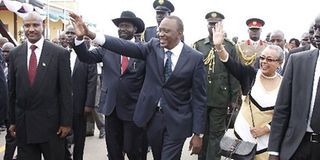President sets out to woo Asian investors in oil and gas sectors

President Uhuru Kenyatta and his wife Margaret wave to a crowd during a past visit to Juba International Airport on May 24, 2013. The President and the First Lady will lead a delegation of more than 60 people to market Kenya’s newly discovered mineral wealth in the East. Photo/FILE
Investment in Kenya’s oil, gas and mineral sectors will dominate President Kenyatta’s eight-day visit to Russia and China starting Thursday.
State House on Wednesday confirmed that the President and First Lady Margaret would lead a delegation of more than 60 people— including Cabinet secretaries, governors and MPs from both the government and the Opposition— to market Kenya’s newly discovered mineral wealth in the East.
“A business delegation of more than 60 people, who are paying their own bills in full, will be at hand to join the President,” the statement noted.
In Moscow, which is the delegation’s first stop, President Kenyatta and his entourage will woo investors to open new markets for Kenya’s traditional exports such as coffee, tea, and fresh produce.
Discussions will also focus on new investment in innovation and technology.
From Russia, Mr Kenyatta will head to China, arriving on Monday to discuss business and investment. Later, he will sign framework agreements on power transmission project for Nairobi as well as on economic and technical cooperation.
Mr Kenyatta will review the $2.5 billion construction of a standard gauge railway from Mombasa to Malaba and a $1.755 billion dam.
He will also hold talks with Chinese Head of State Xi Jinping to “discuss ways of improving Kenya’s infrastructure and interconnectivity, tourism, trade and economic relations, peace and security in the region.”
“Various agreements to support development initiatives and implementation of Vision 2030 flagship projects are expected to be concluded during the visit,” Foreign Affairs Cabinet Secretary Amina Mohammed said in a statement. The trip comes at a time when China has had to defend itself against claims of having a hand in poaching.



